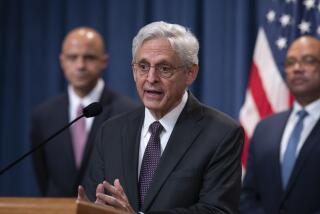Iran again postpones U.S. hikers’ court date
- Share via
Reporting from Tehran and Beirut — Two Americans held in an Iranian prison on espionage charges will not have a chance to defend themselves in court for at least 2 1/2 more months, their lawyer said Sunday.
Masoud Shafii, the lawyer for Americans Shane Bauer and Joshua Fattal, said he received a letter from Revolutionary Court Judge Abolqasem Salavati informing him the court date for the two, originally scheduled for earlier this month, had been postponed until Feb. 6.
Shafii said he was disappointed by the decision. “Each single day added to my clients’ detention is a burden on my conscience and mind,” he said in a phone interview.
Bauer and Fattal, both 28, have been imprisoned in Iran for 16 months after they allegedly crossed the Iraqi border on a hiking trip. Bauer’s fiancee, Sarah Shourd, 32, was released on bail and allowed to return to the United States in September.
Hopes rose last week for the release of Bauer, who grew up in Minnesota and California, and Fattal, raised in Pennsylvania, when an Iranian official voiced optimism their ordeal would soon come to an end.
Mohammed Javad Larijani, Iran’s top human rights official, said he doubted that the men were spies and said he played a role in Shourd’s release.
“We have been able to convince the legal structure that that lady was definitely out of this process,” the U.S.-educated mathematician, a onetime doctoral candidate at UC Berkeley, told NBC’s Ann Curry in an interview aired last week.
Bauer, Fattal and Shourd, all Berkeley graduates, said they were on a hiking trip in the scenic mountains of Iraqi Kurdistan, a relatively secure enclave adjacent to the Iranian frontier, when they were arrested by Iranian authorities and accused of crossing the border illegally. A leaked report posted by the website WikiLeaks suggested that U.S. military officials believed the three were still in Iraq when they were detained.
Iranian authorities later upgraded the charges against the three to espionage amid heightened tensions between Tehran and Washington over the nature of Iran’s nuclear program. They cited no evidence, but say that intelligence and judiciary officials have a strong case.
Iran’s legal system is often baffling. Shafii said the judge had offered no explanation for the delay. The lawyer said he’s done his homework and is ready to face the judge. “I have prepared everything” to mount a defense, he said.
Along with a prosecutor and the judge, Shafii showed up at a previously scheduled Nov. 6 court hearing but left after authorities failed to bring the hikers.
Tehran prosecutor Abbas Jafari Dowlatabadi said this month that Shourd, who was born in the Chicago area but grew up in Los Angeles, must return to Iran for the trial or risk losing the $500,000 bail that was posted for her release, possibly by the Arabian Peninsula nation of Oman.
Iran’s human rights record has come under increased scrutiny because of a crackdown against political activists, labor leaders, students and women rights’ advocates as well as their attorneys after the country’s disputed 2009 reelection of President Mahmoud Ahmadinejad.
By a vote of 80 to 44 with 57 abstentions, a United Nations committee on Thursday adopted a nonbinding resolution calling on Iran to investigate human rights abuses, prosecute offenders, address international concerns about its legal system and allow in international monitors who have been barred from Iran since 2005, when Ahmadinejad first came to power.
Iranian officials accuse the West of using human rights to pressure the Islamic Republic over the nuclear issue. They have recently issued calls to condemn the treatment of prisoners in the U.S. and the alleged abuse against Muslims in Canada, which sponsored the U.N. resolution.
Special correspondent Mostaghim reported from Tehran and Times staff writer Daragahi from Beirut.
More to Read
Sign up for Essential California
The most important California stories and recommendations in your inbox every morning.
You may occasionally receive promotional content from the Los Angeles Times.










